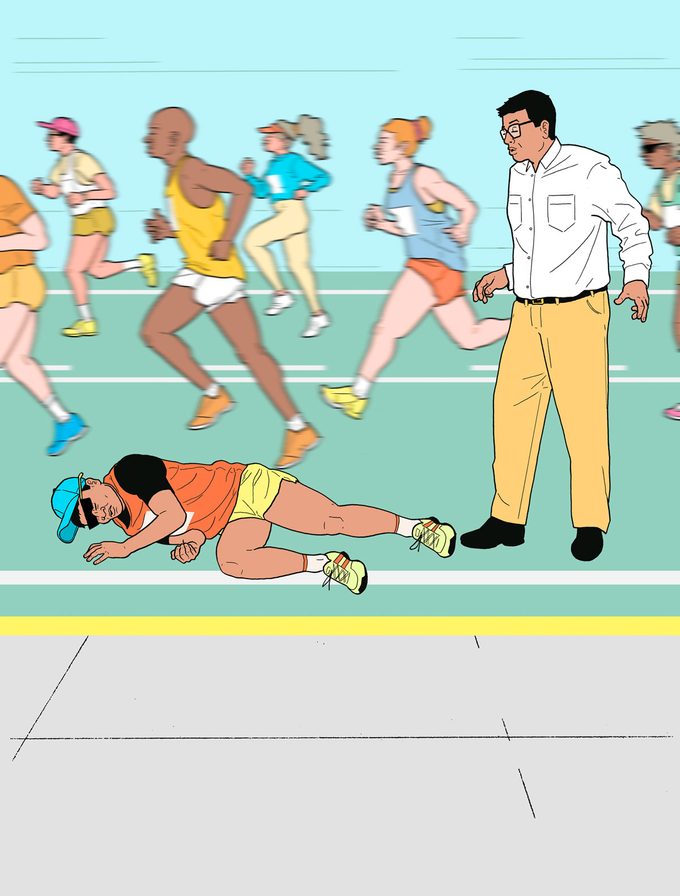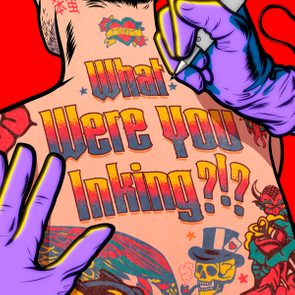Looking for some inspiration (and stories that'll make you feel good)? Look no further than these true tales of good fortune.
6 Tales of Good Fortune That Will Make You Smile

There’s something truly special about hearing the real-life journeys of others. These stories remind us of the good in life, no matter what obstacles come our way. That’s why we’re celebrating six incredible moments of luck and joy—each guaranteed to bring a smile to your face.
From an unexpected romance sparked by a random text to a lifesaving procedure performed just in time, we’ve gathered some of the most heartwarming true stories. So get ready to be inspired, uplifted and reminded that sometimes, life has a way of surprising us in the best possible ways.
Get Reader’s Digest’s Read Up newsletter for more true stories, fun facts, humor, cleaning, travel and tech all week long.
Perfect timing
Tuan Pham was feeling pretty good about himself as he approached the 12-mile mark of the Long Beach Half Marathon in Southern California. The run on Oct. 15, 2023, was the 47-year-old’s seventh such event, and he couldn’t wait to celebrate at the finish line with his teenage son, who had raced ahead. Pham took another step or two, and that was the last thing he remembers.
He can’t recall staggering or falling face-first to the ground, where he lay motionless as runners skirted him. He had no pulse, nor was he breathing. Three blocked arteries had conspired to do him in. He was clinically dead. If he didn’t get help soon, he’d be officially dead. The American Heart Association says the odds of surviving a cardiac arrest outside of a hospital are less than 12%. Pham’s only chance of survival was if someone, say, a cardiologist, happened to pass by. Well …
Just as Pham hit the ground, Ryan Chiu, a cardiothoracic surgeon from MemorialCare Long Beach Medical Center, was leaving a restaurant a few feet away. Dr. Chiu immediately recognized what was happening. He ran to Pham’s side and began chest compressions. He enlisted the help of a bystander, who took over on compressions while Dr. Chiu called his hospital and told them to prepare an operating room and gather a surgical team, stat. They had an emergency on their hands.
Minutes later, an ambulance arrived. Medics scooped up Pham and sped him away to the hospital, with Dr. Chiu following in his own car. The triple bypass surgery that Dr. Chiu performed was a success, and Pham is alive and well—well enough to return to the route of the Long Beach Half Marathon and pick up where he left off.
“I’m that guy,” he told the Long Beach Post. “I’m going back and finishing the last 2 miles.”
Pham likely wouldn’t have had that opportunity if providence hadn’t stepped in. After brunch, Dr. Chiu’s friend asked him to linger a few minutes so they could take in the ocean view. If Dr. Chiu had left the restaurant when he’d intended, he would never have witnessed Pham falling.
“I can’t believe the one guy, the first guy, to see me fall, to show up and give me help, was a cardiac surgeon,” Pham told the Post. “What are the odds?”
Wrong number, right man

Brenda Rivera of Augusta, Georgia, was reading the New International Version of the Bible when Philippians 2:3 caught her eye. The verse was more than a beautiful sentiment: It was a guide to life that she could relate to. She grabbed her phone and typed in the words to text to a friend. Before she could finish, work intruded, and she put her phone aside. She wouldn’t get around to pushing “send” until later that evening.
In Dayton, Ohio, some 700 miles away, Isaiah Stearns was frustrated. He had just bought a cellphone with a new plan. He got home, only to learn that the number didn’t work. He rushed out the door, drove back to the store and got a phone with a number that actually worked. Thirty minutes after returning home, he received his first text. It read: “Do nothing out of selfish ambition or vain conceit. Rather, in humility value others above yourselves.” It made him smile. He tapped back, “Amen to that.” And then he added, “Who is this?”
In a mistake that would change both their lives, Rivera had meant to send the text to a friend whose number now belonged to Stearns. She sent back an apology. He responded, “We’ve never met, but by the looks of your text, I can see that you love God. That’s awesome.” Then he wondered if they could talk on the phone. Soon, they were talking every day, and a budding friendship blossomed into love. But the two had yet to meet in person.
Rivera’s mother, who coincidentally lived near Stearns in Ohio, offered to meet him first and report back. Over dinner, the two laughed and chatted. He shared his backstory, and she answered his questions about her daughter.
“On a scale of 1 to 10, what is he?” Rivera asked when she and her mother caught up by phone, according to The Today Show.
“An 11!” her mother shouted. “You’re going to marry this guy.”
And she did. Four months after that mistaken text in 2009, Rivera and Stearns were engaged, and in 2010, they were married. They now have six children together. So if Rivera hadn’t been suddenly swamped with work, if the phone company hadn’t made a mistake, if Stearns hadn’t quickly fixed the mistake … they would never have known that the other existed. And if Rivera’s mother hadn’t happened to live close enough to Isaiah for her to size him up in person, Brenda may never have had the courage to meet him.
Rivera, now Brenda Rivera Stearns, told England’s Mirror that when people learn how they met and all the happenstance that went into it, “they’re always so surprised. They think we should be in a Hallmark movie.”
The best seat in the house

As 18,000-plus hockey fans filed into Climate Pledge Arena for the Seattle Kraken’s first-ever home game in October 2022, Brian Hamilton, the assistant equipment manager for the visiting Vancouver Canucks, laid out the team’s hockey sticks, masks and bottled water. As he did so, he didn’t notice the woman, Nadia Popovici, who took the seat directly behind him. Nor did she pay much attention to him. That would change soon enough.
Halfway through the action, Popovici’s eyes locked onto something peculiar on the man sitting with the Canucks players. Through the arena glass, she spotted an ugly-looking mole on the back of Hamilton’s neck: reddish and raised with an irregular border. She had seen plenty like it as a hospital volunteer and soon-to-be medical student. It was a cancerous melanoma. She was sure of it. What she wasn’t sure of was how to approach Hamilton.
“It’s so uncomfortable to have something on your body pointed out,” she told the Seattle Times. But she knew she had to say something. As Hamilton lingered near the ice between periods, Popovici, decked in Kraken gear, rapped on the glass, typed a message on her phone and held the screen against the barrier: “The mole on the back of your neck looks like it might be cancerous. You might want to go see a doctor!”
Hamilton glanced at the brightly lit message for only a second. That’s weird, he thought. Walking away, he uneasily rubbed the back of his neck. A few days later, he visited the Canucks’s doctor, who agreed that the mole looked alarming and ordered a biopsy. It came back positive—a stage 2 malignant melanoma, life-threatening if left unattended. Hamilton had the cancerous mole removed, and his prognosis is excellent.
“She took me out of a slow fire,” says Hamilton. “The words out of the doctor’s mouth were if I ignored that for four to five years, I wouldn’t be here.”
The two connected at the next Canucks-Kracken matchup, where Hamilton was able to thank his guardian angel in person and tell her that his mom loves her. No thanks were necessary, Popovici told the Athletic. “It was just one moment in our lives where we crossed paths at the right time.”
Finding mom

Sue Cleaver never thought she’d meet her birth mother. Cleaver, an actress known for her 20-year run on the British soap opera Coronation Street, had been adopted as a newborn into a family that loved her and that she loved back. All she knew about her adoption was her birth mother’s name, Lesley Sizer Grieve, and that she was born in north London. She didn’t need to know any more, but she still sometimes struggled with her identity.
“It was hard never seeing myself in another person,” Cleaver wrote in her memoir, A Work in Progress. All that changed when she was in her early 20s. As a young actress, Cleaver landed a role in a production of Oedipus Rex. A castmate, Michael N. Harbour, couldn’t take his eyes off her.
“My God,” he said to a stage manager, “she’s the spitting image of my wife when I met her.”
The two actors got to talking at a cast dinner party and hit it off.
“I was completely obsessed with him and fascinated by his family; I wasn’t sure why,” Cleaver writes. Harbour asked Cleaver where she was from. North London, she told him, a little town called Barnet. Then, an eyebrow raised, he asked her birthday. “Sept. 2, 1963,” she responded.
Harbour had to take a deep breath. Cleaver’s story matched, he was convinced, that of his wife, Lesley Sizer Grieve. As a teenager, Grieve had put her newborn daughter, whom she’d named Claire, up for adoption. Five years later, she married Harbour, and they had two daughters together. After speaking with his wife, Harbour visited Cleaver’s apartment to share the news. At first, she was skeptical. Armed with the knowledge of her mother’s unusual middle name, she decided to quiz Harbour.
“Your name is Claire Grieve. Your mother is Lesley Sizer Grieve,” he correctly answered.
Cleaver was overwhelmed. She was also thrilled. She allowed Harbour to arrange for birth mother and daughter to meet at a hotel. When Grieve opened the door, both stepped forward and hugged without saying a word.
“Neither of us knew quite how to deal with it—it was like falling in love,” says Cleaver.
Coincidences with co-stars didn’t stop with Harbour. Helen Worth, also on Coronation Street, is godmother to Cleaver’s half-sister and a longtime friend of Grieve’s.
“She’d drop things into conversation such as ‘You were so like Lesley in that last scene,’ ” Cleaver says.
Surviving a flood and finding love

Getting caught in a flood is no one’s idea of a lucky day. Unless you’re Justin and Jessica Walker.
It was August 2004. Jessica, then a Virginia Commonwealth University student, was waiting outside the campus gym, her ride home nowhere to be seen. Justin walked out and offered a ride and shelter from the increasing downpour, a remnant of Tropical Storm Gaston, which was wreaking havoc in Richmond, Virginia. She recognized him from orientation a few days before.
“I was like, OK, maybe he’s hitting on me,” Jessica later told WTVR. But it was raining buckets, so she accepted.
Buckets turned to barrels as Justin, new to Richmond, made a wrong turn onto Main Street, landing the two in bumper-to-bumper traffic crippled by rising floodwaters and abandoned cars. Just when the two thought their luck couldn’t get worse, a wave crested over Justin’s car, flooding the engine and sending rainwater through the air vents. Suddenly, the water was up to their laps and rising. It was time to move. Justin grabbed her door handle and in one fell swoop opened Jessica’s door and shoved her out of the car.
Battling rushing water and debris, the two made it to the steps of a nearby train station. They spent the next few hours helping others to safety inside the station until Amtrak sent a train to carry the stranded to higher ground. Shivering in wet clothes, sharing a measly half-sandwich and a beer, Justin and Jessica’s connection crackled.
“I’m one of those people who needs a sign, and I thought, Daggone, if God isn’t giving me a sign right now, I’m a fool,” says Jessica. “And I knew: This is the man I’m gonna marry.”
If Justin hadn’t made a wrong turn, the two likely would have skirted the flood and may never have spoken again. Instead, four years later, Justin and Jessica were married. “I lost a car but gained a wife,” says Justin.
The lottery

Games of chance are by their very nature all about luck. As these two stories show, sometimes an extra dose of good fortune is required.
A few years ago, LaQuedra Edwards was inside a Vons supermarket in Tarzana, California, depositing $40 into a lottery vending machine to buy four tickets for $10 each. As she was about to hit the button, a man walking by bumped her arm, causing Edwards to punch the wrong button and buy a $30 scratch-off ticket—far pricier than what she liked to play. Frustrated, she left the store, climbed into her car and examined her ticket. She had 10 numbers and 35 squares to scratch off. Each number that matched a square would pay her a sum of money, ranging from $10 to $10 million. She pulled a coin out of her purse and scratched at the first box. No match. Then another box. Nothing.
She kept scratching away, her hopes dimming with each clunker. And then there was a match. She stopped scratching and took a deep breath. She placed the ticket on her lap and drove home, stealing glances at that ticket.
“I almost crashed,” she later told the lottery officials. “I just kept thinking, This can’t be right.”
That bump from the rude guy may well have been the most profitable accidental collision ever. The ticket she hadn’t wanted was a winner. A big winner. As in $10 million.
In another twist of lottery fate, Jerry Hicks was walking into a Speedway convenience store in Banner Elk, North Carolina, last October when he spotted a $20 bill in the parking lot. Bad luck for someone else turned into a lucky break for Hicks. He decided to use his windfall to buy a lottery ticket. He sought one he’d played before, but the store didn’t sell it. He settled for another, adding $5 to his new $20 bill to buy a $25 Extreme Cash scratch-off ticket. In an instant, the $20 he’d found had turned into $1 million.
A master carpenter, Hicks said he planned to use his winnings to retire and help his children.
But first, he laughingly told lottery officials, “We’re going to Golden Corral and eat everything they’ve got.”
Why trust us
At Reader’s Digest, we’re committed to producing high-quality content by writers with expertise and experience in their field in consultation with relevant, qualified experts. We rely on reputable primary sources, including government and professional organizations and academic institutions as well as our writers’ personal experiences where appropriate. We verify all facts and data, back them with credible sourcing and revisit them over time to ensure they remain accurate and up to date. Read more about our team, our contributors and our editorial policies.
Sources:
- People: “Marathon Runner Suffered Cardiac Arrest, Was Saved by Heart Surgeon Who Saw Him Collapse: ‘What Are the Odds?'”
- Mirror: “Woman accidentally sends message to wrong number – but reply changed her life forever”
- Today: “She texted a bible verse to a wrong number. He replied. 14 years later …”
- People: “Man Was Angry He Couldn’t Buy the Lottery Ticket He Wanted. Then He Won $9.2M Prize: ‘Speechless'”
- Calottery: “LA County Player Wins $10 Million After Accidentally Pushing Wrong Button on Scratchers® Vending Machine!”
- WYFF: “$20 bill found on ground leads to $1 million win for North Carolina lottery player, officials say”






















